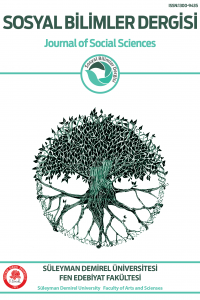Öz
19.
yüzyıl, İngiliz toplumsal reformlar, ekonomik büyüme, teknolojik ve bilimsel
yenilikler, kültürel evrim, sanayileşme vb. olmak üzere yaşamının her alanında
meydana gelen gelişmelerin olduğu bir refah çağıydı. Ancak, 20. yüzyılın
başında Kraliçe Victoria'nın ölümüyle İngiliz halkı çalkantılı bir son
beklemekteydi ve savaş hayatlarının en önemli gerçeğiydi. Birçok şair, savaşın
ilk yıllarında onur, şan, vatanseverlik be kahramanlığı ele alırken savaşın
sonraki yıllarında ortaya çıkan şiir zulüm, acımasızlık ve keder gibi konuları
ve savaşın beyhudeliğini işledi. Sonraki şairler kahramanlık, vatanseverlik ve
fedakârlık gibi ölümsüz değerlere kuşkuyla yaklaştılar ve aynı zamanda savaşı
körü körüne destekledikleri için generalleri, politikacıları ve kilise adamlarını
eleştirdiler. Şiir, giderek artan dehşet, asker ve sivillerin yaşadığı kelimelerle
anlatılamayacak acılar ve çamurlu siperlerde meydana gelen toplu katliamlar
nedeniyle yeniden şekillendi. Savaş sadece milyonlarca insanı öldürmedi; aynı
zamanda bir zamanlar milyonlarca insanı vatanı için ölüme gönderebilecek şiir
formunu da öldürdü. Bu tarz şiir, duygusallık ve aşırı milliyetçilik
unsurlarından dolayı aşağılayıcı bir şekilde hicvedildi. Bu çalışma, en çok
okunan İngiliz savaş şiirlerinden bir tanesi olan Rosenberg'in Siperde Şafak
Vakti adlı şiirine daha derin tartışmacı yaklaşımlar getirmeyi
amaçlamaktadır.
Anahtar Kelimeler
Savaş şiiri İngiltere Georgian şiiri tartışma savaş cephe kahramanlık
Kaynakça
- Barnes, J. (Ed.). (1995). Complete Works of Aristotle, Volume 1: The Revised Oxford Translation. Princeton University Press.
- Bullough, Geoffrey (1941), The Trend of Modern Poetry, Edinburgh: Oliver and Boyd.
- Das, Santanu. (2009) “War Poetry and the Realm of the Senses: Owen and Rosenberg”. In Kendall ed. The Oxford Handbook of British and Irish War Poetry. Oxford University Press.
- Diego, C. Alvarez (2011). The Imagery of Landscape in the English Poetry of the First World War, Philologica Urcitana Revista Semestral de Iniciación a la Investigación en Filología Vol. 4 (Marzo 2011) 51–62 Departamento de Filología – Universidad de Almería (ISSN: 1989-6778)
- Gorayska, Barbara and Roger Lindsay. (1993). The roots of relevance. Journal of Pragmatics. 19: 301-323.
- Mey, Jacob L. (1995). “On Gorayska and Lindsay’s Definition of Relevance.” Journal of Pragmatics. 23, 341-42.
- Sassoon, ‘Foreword’, in The Collected Works of Isaac Rosenberg, ed. Ian Parsons (London: Chatto & Windus, 1984), p. ix.
- Silkin, Jon. (1972) "The Poetry of Geoffrey Hill." The Iowa Review 3.3. 108-128. Web.
- Sisson, Charles Hubert (1981). English Poetry 1900-1950: An Assessment. Manchester: Carcanet Press.
- Walton, D. (1990). Practical Reasoning. Savage: Rowman and Littlefield.
- Walton, D. (2004). Relevance in Argumentation. Lawrence Erlbaum Associates, Inc. , USA.
- Wilensky, R. (1983). Planning and Understanding: A Computational Approach to Human Reasoning. Reading, Mass.: Addison-Wesley.
- Wood, Nancy V., Miller J.S. (2017). Perspectives on Argument. Pearson Education: London.
Öz
The 19th century was an age of prosperity with developments in every sphere of British life – made up of social reforms, economic growth, technological and scientific innovations, cultural evolution, industrialisation, etc. Yet, the British people were waiting for a turbulent destiny for their country with the death of Queen Victoria at the beginning of the 20th century, and war was the single most important fact of their life. Many poets dealt with honour, glory, patriotism, and heroism in the early years of the war which is completely at odds with the poetry that emerged from the later years of the war that spoke of the cruelty, brutality, and sorrow, and addressed the futility of war. Future poets were skeptical about the eternal values such as heroism, patriotism, and sacrifice, and they also criticized generals, politicians, and churchmen for their blind support of the war. The poetry was reshaped due to the ever increasing horrors, unspeakable suffering of soldiers and civilians, and mass murders in the muddy trenches. The war did not merely kill millions of people; it also killed off the form of poetry which could once urge millions of people to die for their country – which was contemptuously satirized for sentimentality and jingoism. This paper aims at analyzing Rosenberg’s Break of Day in the Trenches to provide deeper argumentative insights into one of the most read British war poetry.
Anahtar Kelimeler
War poetry Britain Georgian poetry argumentation war trenches heroism
Kaynakça
- Barnes, J. (Ed.). (1995). Complete Works of Aristotle, Volume 1: The Revised Oxford Translation. Princeton University Press.
- Bullough, Geoffrey (1941), The Trend of Modern Poetry, Edinburgh: Oliver and Boyd.
- Das, Santanu. (2009) “War Poetry and the Realm of the Senses: Owen and Rosenberg”. In Kendall ed. The Oxford Handbook of British and Irish War Poetry. Oxford University Press.
- Diego, C. Alvarez (2011). The Imagery of Landscape in the English Poetry of the First World War, Philologica Urcitana Revista Semestral de Iniciación a la Investigación en Filología Vol. 4 (Marzo 2011) 51–62 Departamento de Filología – Universidad de Almería (ISSN: 1989-6778)
- Gorayska, Barbara and Roger Lindsay. (1993). The roots of relevance. Journal of Pragmatics. 19: 301-323.
- Mey, Jacob L. (1995). “On Gorayska and Lindsay’s Definition of Relevance.” Journal of Pragmatics. 23, 341-42.
- Sassoon, ‘Foreword’, in The Collected Works of Isaac Rosenberg, ed. Ian Parsons (London: Chatto & Windus, 1984), p. ix.
- Silkin, Jon. (1972) "The Poetry of Geoffrey Hill." The Iowa Review 3.3. 108-128. Web.
- Sisson, Charles Hubert (1981). English Poetry 1900-1950: An Assessment. Manchester: Carcanet Press.
- Walton, D. (1990). Practical Reasoning. Savage: Rowman and Littlefield.
- Walton, D. (2004). Relevance in Argumentation. Lawrence Erlbaum Associates, Inc. , USA.
- Wilensky, R. (1983). Planning and Understanding: A Computational Approach to Human Reasoning. Reading, Mass.: Addison-Wesley.
- Wood, Nancy V., Miller J.S. (2017). Perspectives on Argument. Pearson Education: London.
Ayrıntılar
| Birincil Dil | İngilizce |
|---|---|
| Bölüm | Filoloji |
| Yazarlar | |
| Yayımlanma Tarihi | 28 Aralık 2018 |
| Yayımlandığı Sayı | Yıl 2018 Sayı: 45 |
Kaynak Göster
Süleyman Demirel Üniversitesi Fen-Edebiyat Fakültesi Sosyal Bilimler Dergisi


